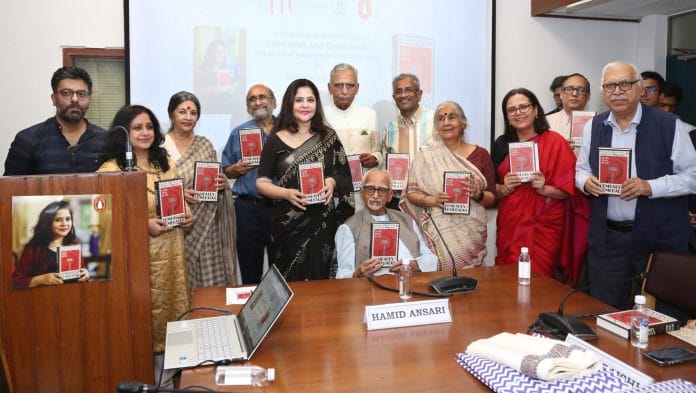New Delhi: That 21st-century India will be so far from its Left roots would have been unimaginable at the time of Independence. But has over a decade of Right-wing politics truly cemented a no-come–back for the ideology and its representatives—a question that lurks around the minds of the Indian Leftists.
“Only the genuine people, the secular people in the country are the Left,” said Sanjay Hegde, a Supreme Court advocate, at the launch of the book Comrades and Comebacks by educator and activist Saira Shah Halim, who also contested the 2024 Lok Sabha elections on a CPI(M) ticket in West Bengal. The book analyses the state of the Indian Left.
The launch at the India International Centre featured a panel discussion examining the historical role and contemporary relevance of Left-wing politics in India. The event had been attended by former Vice President Hamid Ansari, former Chief Election Commissioner SY Quraishi, former Member of Parliament Subhashini Ali, author and translator Rakshanda Jalil, and Hegde, with senior journalist Paranjoy Guha Thakurta as moderator, alongside several academics, students, and social activists.
For Halim, the country’s ‘growing income inequality, rising inflation, religious fundamentalism, and growing inequality’ need a radical, albeit non-violent approach. Secular parties need to do more than to take the soft stand they currently take on these issues.
For the Generation-Z, and younger millennial voters in India today, their coming of age coincided with the BJP’s dominance. Halim told the audience that her book has been written for lay readers, aiming to make the history of the Left accessible and jargon–free. Her goal was to present world history, Indian history, and economic theories to young readers.
During the Q&A session moderated by Thakurta, Halim urged young people to contribute towards political change. She asserted that some people are in jail for dissenting against powerful voices.
“That’s the price for freedom, and that’s the price Bhagat Singh and Che Guevara paid,” Halim said.
Also read: Romila Thapar’s packed IIC lecture had scathing questions for NCERT and Hindutva
Steady decline of the Left
Halim claimed the steady decline that the Left-wing politics has witnessed in popular consciousness has also meant diminished zeal for conversations on the caste and class divide.
Former Rajya Sabha MP Brinda Karat claimed that Halim’s book was relevant to understanding class divides and exploitation in contemporary India, stressing its value as an antidote to toxic politics.
While the Left-led CPI(M)’s dominance in West Bengal and Kerala has had a rich history, the Left in India has struggled to find space for its ideology in contemporary politics, rarely gaining momentum for expansion.
Halim’s book argues that Left ideology remains vital in confronting inequality, authoritarianism, and communal divisions. It also highlights the continuing importance of solidarity in political action. Hegde praised Halim’s attempt at “swimming upstream” during a time marked by constant declarations of the Left’s demise.
“The Left, no matter what name you give it, wants the betterment of the country,” said Lt Gen Zameer Uddin Shah (retd), former Deputy Chief of Army Staff and former Vice-Chancellor of Aligarh Muslim University.
Halim’s passion for chronicling the history of the Left and a potential path for its future in India has resonance with many, evident in the strong turnout.
“Today’s very popular subject could attract so many people in this city. It speaks volumes,” said Ansari in his address.
Rakshanda Jalil said that the book is a conversation starter and called for its adaptations into visual and cinematic mediums to reach wider audiences, emphasising the importance of cultural messaging, citing inspirational songs like Chhodo Kal Ki Baatein that carried ideas across India.
Hedge declared the book as “the next little red book”, opening conversations for the continued relevance of Left discourse in shaping India’s democratic future.
Priyanka Mehta is an alumna of ThePrint School of Journalism (Batch 3).
(Edited by Saptak Datta)







Left now is a Islamist . Sare Mulla ek Sath Ho kar book launch wo bhi left ke naam per ??. BJP now is more left then this Islamist ?